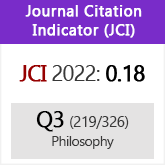The Political Potentiality of Aesthetic Judgment: on Arendtian Reappropriation of Kant
DOI:
https://doi.org/10.3989/isegoria.2016.054.08Keywords:
Hannah Arendt, Kant, aesthetic judgment, communicability, Philosophy of history, Public Use of Reason, French RevolutionAbstract
Hannah Arendt’s asseveration: that Kant’s unwritten political philosophy lies in the third critique, has led to the concentration almost exclusively on her reading of the aesthetic judgment. However, Arendt analyzes during most of her lectures on Kant his philosophy of history and his political writings. I intend to show that the peculiar reappropriation that Arendt makes of Kant proceeds in a double movement which, on the basis of these texts links them with the third critique so that both are reconfigured. Thus, I argue that the Kantian view of the French Revolution and the public use of reason, allows Arendt to put the aesthetic judgment in an actual communicative horizon.
Downloads
References
Arendt, Hannah (1992): Lectures on Kant's Political Philosophy, Ronald Beiner (ed.), Chicago, University of Chicago Press.
Arendt, Hannah (1996): Entre el pasado y el futuro. Ocho ejercicios sobre la reflexión política, trad. de Ana Poljak, Barcelona, Península.
Arendt, Hannah (1997): ¿Qué es la política?, Ursula Ludz (ed.), trad. de Rosa Sala Carbó, Barcelona, Paidós.
Arendt, Hannah (1999): Los orígenes del totalitarismo, trad. de Guillermo Solana, Madrid, Taurus.
Arendt, Hannah (2001a): La condición humana, trad. de Ramón Gil Novales, Barcelona, Paidós.
Arendt, Hannah (2001b): Hombres en tiempos de oscuridad, trad. de Claudia Ferrari y Agustín Serrano de Haro, Barcelona, Gedisa.
Arendt, Hannah (2002): La vida del espíritu, Mary McCarthy (ed.), trad. C. Corral y F. Birulés, Buenos Aires, Paidós.
Arendt, Hannah (2003): Conferencias sobre la filosofía política de Kant, Ronald Beiner (ed.), trad. de Carmén Corral, Barcelona, Paidós.
Arendt, Hannah (2005): Ensayos de comprensión 1930-1954, trad. de Agustín Serrano de Haro, Madrid, Caparrós.
Arendt, Hannah (2007): Responsabilidad y juicio, Jerome Kohn (ed.), trad. de Miguel Candel, Barcelona, Paidós.
Arendt, Hannah (2008): "Martin Heidegger cumple 80 a-os (1969)", en Anders, Günther; Arendt, Hannah; Jonas, Hans; Löwith, Karl; Strauss, Leo, Sobre Heidegger. Cinco voces judías, trad. de Bernardo Ainbinder, Buenos Aires, Manantial.
Arendt, Hannah; Scholem, Gershom (2010): Der Briefwechsel, Berlin, Suhrkamp.
Beiner, Ronald (1997): "Rereading Hannah Arendt's Kant Lectures", Philosophy & Social Criticism, 23, 1, pp. 21-32. http://dx.doi.org/10.1177/019145379702300102
Beiner, Ronald (2003): "Hannah Arendt y la facultad de juzgar", en Arendt, Hannah, Conferencias sobre la filosofía política de Kant, trad. de Carmen Corral, Buenos Aires, Paidós, pp. 157-270.
Benhabib, Seyla (1998): "Models of Public Space: Hannah Arendt, the Liberal Tradition, and Jürgen Habermas", en Joan Landes (ed.), Feminism, the Public and the Privat, New York, Oxford University Press, pp. 65-99. PMid:18255936
Benhabib, Seyla (2000): The Reluctant Modernism of Hannah Arendt, Walnut Creek, Altamira Press. PMid:18252401
Birulés, Fina (2007): Una herencia sin testamento: Hannah Arendt, Barcelona, Herder.
Camps, Victoria (2006): "Hannah Arendt. La moral como integridad", en Manuel Cruz (comp.), El siglo de Hannah Arendt, Barcelona, Paidós, pp. 63-85.
Degryse, Annelies (2011): "Sensus communis as a Foundation for Men as Political Beings: Arendt's Reading of Kant's Critique of Judgment", Philosophy and Social Criticism, 37, 3, pp. 345–358. http://dx.doi.org/10.1177/0191453710389452
Di Pego, Anabella (2012): "La revelación del «quién» en el mundo contemporáneo. Consideraciones a partir de las concepciones de Hannah Arendt y de Paul Ricoeur", Revista de Filosofía y Teoría Política, 43, pp. 45-78.
Forti, Simona (2001): Vida del espíritu y tiempo de la polis. Hannah Arendt entre filosofía y política, trad. de Irene Romera Pintor y Miguel Ángel Vega Cernuda, Madrid, Cátedra. PMCid:PMC95520
Garsten, Bryan (2007): "The Elusiveness of Arendtian Judgment", Social Research, 74, 4, pp. 1071-1108.
Gilgen, Peter (2012): "Plurality without Harmony: on Hannah Arendt's Kantianism", The Philosophical Forum, pp. 259-275. http://dx.doi.org/10.1111/j.1467-9191.2012.00424.x
Goldman, Avery (2010): "An Antinomy of Political Judgment: Kant, Arendt, and the Role of Purposiveness in Reflective Judgment", Continental Philosophy Review, 43, pp. 331–352 http://dx.doi.org/10.1007/s11007-010-9147-4
Heidegger, Martin (1954): Kant y el problema de la metafísica, trad. de Gred Ibscher Roth revisada por Elsa Cecilia Frost, México, Fondo de Cultura Económica.
Heuer, Wolfgang; Heiter, Bern; Rosenmüller, Stefanie (2011) (Eds.): Arendt
Jay, Martin (2000): "El existencialismo político de Hannah Arendt", en Fina Birulés (comp.), Hannah Arendt. El orgullo de pensar, trad. de Javier Calvo Perales, Barcelona, Gedisa, pp. 147-176. PMid:10652660
Kant, Immanuel (1968): Kants Werke, Akademie Textausgabe (tomos I-IX), Berlin, Walter de Gruyter & Co.
Kant, Immanuel (2003): Crítica del discernimiento, edición y traducción de Roberto R. Aramayo y Salvador Mas, Madrid, Antonio Machado.
Kant, Immanuel (2010a): "Contestación a la pregunta: ¿Qué es la ilustración?", en Kant II, trad. de Roberto R. Aramayo, Madrid, Gredos, pp. 1-9.
Kant, Immanuel (2010b): "Idea para una historia universal en clave cosmopolita", en Kant II, trad. de Roberto R. Aramayo, Madrid, Gredos, pp. 11-27.
Kant, Immanuel (2010c): Crítica del juicio, en Kant II, trad. de Manuel García Morente, Madrid, Gredos, pp. 299-604.
Kant, Immanuel (2010d): "El conflicto de las facultades en tres partes. Segunda parte: El conflicto de la facultad filosófica con la jurídica. Replanteamiento de la pregunta sobre si el género humano se halla en continuo progreso hacia lo mejor", en Kant II, trad. Roberto R. Aramayo, Madrid, Gredos, pp. 793-809.
Lyotard, Jean-François (1994): Lessons on the Analytic of the Sublime, trad. Elizabeth Rottenberg, California, Standford University Press.
Lyotard, Jean-François (2009): El entusiasmo. Crítica kantiana de la historia, trad. Alberto Bixio, Barcelona, Gedisa.
Naishtat, Francisco (2005): "Revolución, discontinuidad y progreso en Kant. Revolución copernicana y revolución asintótica en la filosofía crítica", Revista Latinoamericana de Filosofía, XXXI, 2, pp. 281-299.
Rivera de Rosales, Jacinto (2005): "Kant y Hannah Arendt. La comunidad del juicio reflexionante", Ideas y Valores, 128, pp. 1-33.
Rodríguez Aramayo, Roberto (1994): "El utopismo ucrónico de la reflexión kantiana sobre la historia. Estudio introductorio", en Kant, Immanuel, Ideas para una historia universal en clave cosmopolita y otros escritos sobre Filosofía de la Historia, Madrid, Tecnos, pp. IX-XXXIX.
Villa, Dana R (1992): "Beyond Good and Evil. Arendt, Nietzsche, and the Aestheticization of Political Action", Political Theory, 20, 2, pp. 274-308. http://dx.doi.org/10.1177/0090591792020002004
Villa, Dana R (2006): "Introduction: The Development of Arendt's Political Thought", en The Cambridge Companion to Hannah Arendt, Cambridge, ambridge University Press, pp. 1-21.
Weidenfeld, Matthew C. (2012): "Visions of Judgment: Arendt, Kant and the Misreading of Judgment", Political Research Quarterly, 66, 2, pp. 254-266. http://dx.doi.org/10.1177/1065912912446228
Wellmer, Albrecht (2000): "Hannah Arendt sobre el juicio: La doctrina no escrita de la razón", en Fina Birulés (comp.), Hannah Arendt. El orgullo de pensar, trad. de Javier Calvo Perales, Barcelona, Gedisa, pp. 259-280.
Yar, Majir (2000): "From Actor to Spectator: Hannah Arendt's 'Two Theories' of Political Judgment", Philosophy & Social Criticism, 26, 2, pp. 1-27. http://dx.doi.org/10.1177/019145370002600201
Downloads
Published
How to Cite
Issue
Section
License
Copyright (c) 2016 Consejo Superior de Investigaciones Científicas (CSIC)

This work is licensed under a Creative Commons Attribution 4.0 International License.
© CSIC. Manuscripts published in both the printed and online versions of this Journal are the property of Consejo Superior de Investigaciones Científicas, and quoting this source is a requirement for any partial or full reproduction.All contents of this electronic edition, except where otherwise noted, are distributed under a “Creative Commons Attribution 4.0 International” (CC BY 4.0) License. You may read here the basic information and the legal text of the license. The indication of the CC BY 4.0 License must be expressly stated in this way when necessary.
Self-archiving in repositories, personal webpages or similar, of any version other than the published by the Editor, is not allowed.














